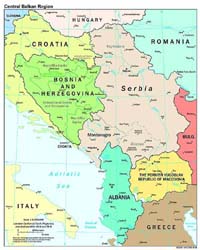U.S. wants to solve Kosovo status by year end
A U.S. envoy for international talks on Kosovo's future reiterated Monday that the solution of the province's disputed status should to be reached by the end of 2006. Frank Wisner, who met with ethnic Albanian leaders, said the United States is committed "to achieving final status for Kosovo ... during this year, 2006."

Wisner's comments contrasted to those of Russia's Foreign Minister, Sergey Lavrov, who warned last week against setting deadlines for the talks. Lavrov on Friday blamed Kosovo's government for a lack of progress in the talks, and said the international community should not push for an end-of-the-year deadline to settle the issue.
But Wisner praised the province's predominantly ethnic Albanian government for reaching out to Serbs and other minorities, while urging them to continue with the work in the ongoing U.N.-mediated talks with Serbia on whether Kosovo becomes independent or remains part of Serbia.
In Belgrade, Serbia's Prime Minister, Vojislav Kostunica, "expressed dissatisfaction with the course of negotiations so far, particularly the way they are being directed by the mediators," his office said in a statement after he met with Martti Ahtisaari, the chief U.N. envoy on Kosovo status.
Some form of independence for Kosovo is the most likely outcome of the talks, but international envoys are trying to steer the two sides toward agreements on issues ensuring the survival of the Serb minority, who live in enclaves scattered around this tiny province.
Wisner's and Ahtisaari's visit to Kosovo and Serbia come as Montenegro voted in a referendum to split from Serbia and become an independent state. Preparations are taking place for the next round of talks between ethnic Albanian and Serbian officials, tackling the protection of Serbian Orthodox churches and other religious sites in Kosovo.
The two sides have held four meetings so far on the reform of local government meant to give the province's Serbs more rights in the areas where they live, but failed to agree on virtually everything. Kosovo remains formally part of Serbia-Montenegro, but its ethnic Albanian majority wants independence, while Serbs living in the province demand that it remain linked to Serbia. Ethnic Albanians comprise about 90 percent of Kosovo's population of 2 million.
Kosovo has been administered by the United Nations since a 1999 NATO air war halted a crackdown by Serb forces on separatist ethnic Albanians. The U.N. mediators have said they expect to call in July for direct status talks between ethnic Albanians and Serbian officials, reports the AP.
N.U.
Subscribe to Pravda.Ru Telegram channel, Facebook, RSS!


